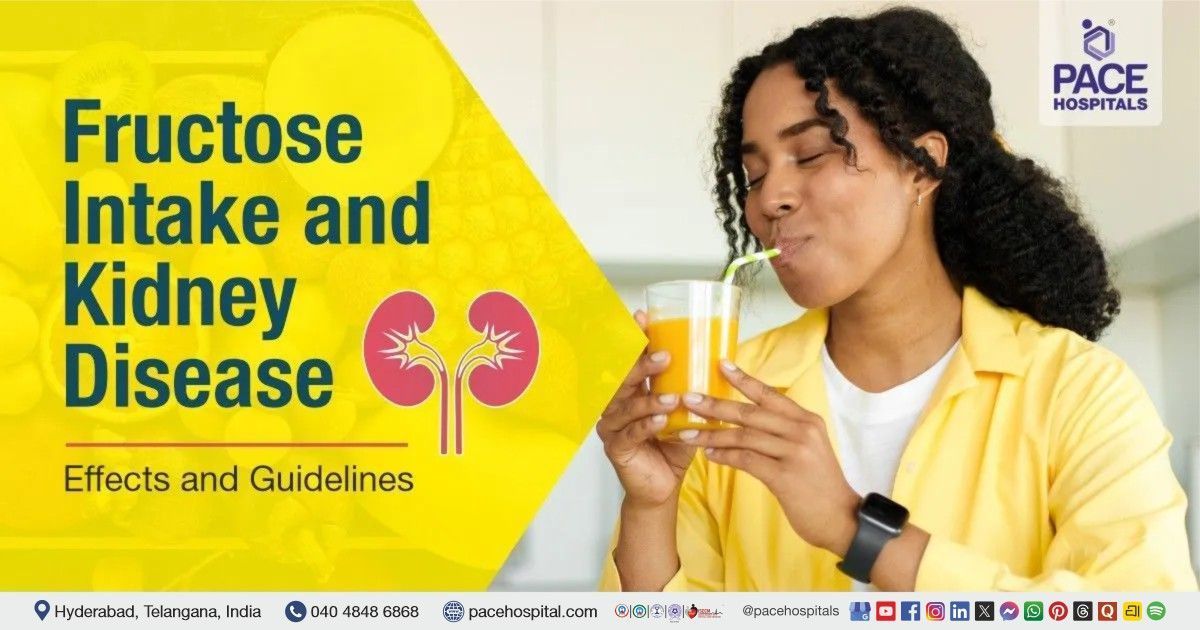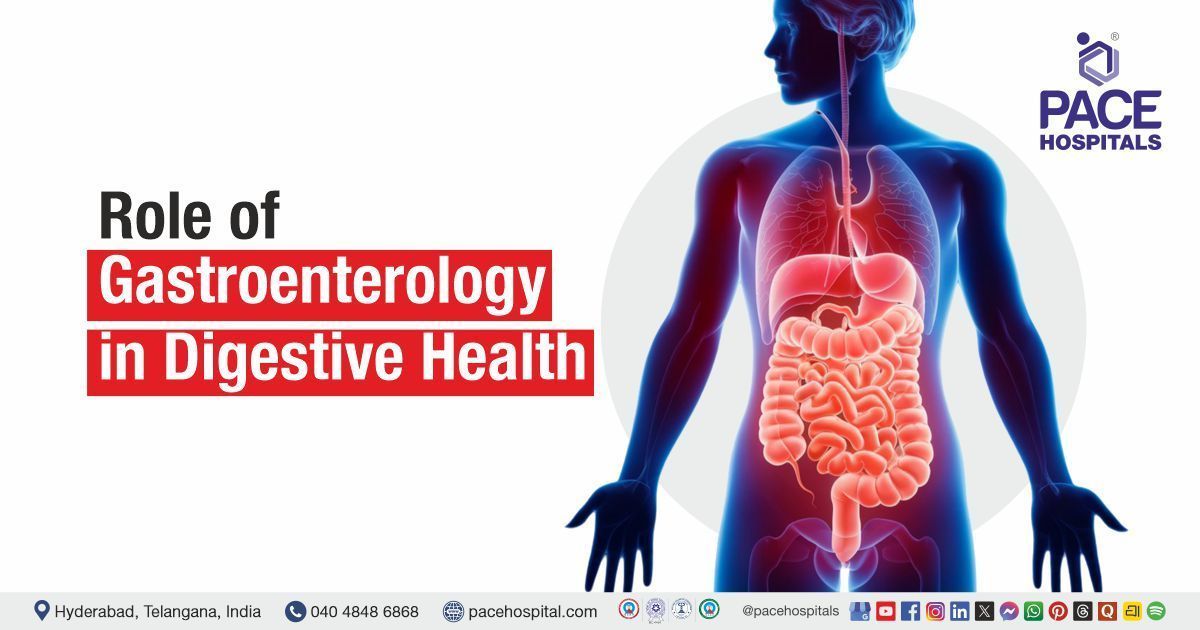Fructose Intake and Kidney Disease - Effects & Guidelines
PACE Hospitals
Fructose is the primary nutrient in fruits and honey, giving them a sweet taste. There are two important sources of fructose in the diet.
- Refined Sugar: The first source of fructose is refined sugar, it is made from sugarcane, sugar beets, and palm. Recently, intake of refined sugar in the diet has increased. Refined sugar has sucrose, which is made of glucose and fructose. Refined sugar is added to sweets, desserts, alcohol, soft drinks, and other common foods.
- High Fructose Corn Syrup (HFCS): The second source of fructose in the diet is high fructose corn syrup (HFCS). It is derived from corn. The advantage of HFCS is it crystallizes less compared to refined sugar. Because of this feature, it is added to frozen foods.
Refined sugar & high fructose corn syrup are usually added to soft drinks, desserts, processed food, and baby foods. Fructose is also generated in the body in a few conditions. There is high fructose generation in the body in patients with diabetes, high salt diet, high sugar diet, Gout, metabolic syndrome, dehydration, and kidney disease. High fructose intake can lead to various deleterious effects on our bodies.
Sugar (sucrose) and high fructose corn syrup in the diet are broken down in the intestines, and fructose is released. Fructose is absorbed from the intestines into the blood and transported to the liver. Fructose is metabolized in the liver. Fructose metabolism in the liver can produce glucose and lactate. At the same time, fructose decreases the energy levels inside the cells. Because of this decrease in energy levels inside the cells, more uric acid is generated. This uric acid is the main reason for the harmful effects associated with high fructose intake. Uric acid can cause lead to -
- Increases the oxidative stress inside the cells.
- Diabetes
- High blood pressure (hypertension)
- Obesity
- Liver disease
- Kidney injury
Fructose and Its Effects on Kidney
High fructose intake, leading to diabetes, hypertension, obesity, and metabolic syndrome, increases the chronic kidney disease risk. Uric acid may directly damage the kidneys by causing scarring in the kidneys. It can lead to increased pressures inside the glomeruli (functioning units of the kidney) which can have harmful effects on the kidney.
In patients suffering from chronic kidney disease, it can worsen the protein loss in the urine (proteinuria). More than or equal to 2 servings of soda or drink with fructose can increase the risk of kidney disease.
Guidelines for fructose intake in kidney disease patients
- Food with high refined sugar or high fructose corn syrup can increase insulin resistance, obesity, and fatty liver.
- The risk is heightened with products containing sugar in liquid forms, like soft drinks, power drinks, sugary teas, and fruit punches. So, it is better to avoid them.
- Natural fruits have less fructose and contain fiber, which delays fructose absorption. Fruits also contain certain chemicals which are protective of the body.
- Fruit juices can have high fructose content, so it is better to avoid them.
- If fruits or sweet taste is desired, it is better to take natural fruit after discussing with a nephrologist and dietician, which are acceptable.
- In dialysis patients, salt and sugar increase thirst and excess weight gain between dialysis sessions. So, they are recommended for both salt restriction and avoiding excess sugar intake.
- Refined sugar recommendations are six teaspoons (25 grams) for women and nine teaspoons (37.5 grams) for men in a whole day.
Frequently Asked Questions on Fructose Intake and Kidney Health
Why fructose intake is linked to kidney health concerns?
Excess fructose intake can alter metabolic pathways that increase uric acid production and oxidative stress. Over time, these changes may strain kidney function and contribute to long-term renal damage, especially in high-risk individuals.
Is fructose harmful to everyone’s kidneys?
Not necessarily. Moderate fructose from natural sources is usually tolerated. However, excessive intake, especially from processed foods and sweetened beverages, can be problematic, particularly for those with existing risk factors.
How is fructose different from glucose in its effect on kidneys?
Fructose is primarily metabolized in the liver and can rapidly increase uric acid levels. This metabolic pathway causes more stress on the kidneys than glucose, which is more uniformly regulated by insulin.
Can fructose worsen chronic kidney disease (CKD)?
High fructose intake in people with chronic kidney disease (CKD) may hasten disease development by raising metabolic stress and inflammation. Dietary moderation becomes especially crucial in such situations.
Does fructose influence blood pressure levels?
Yes. High fructose intake has been associated with increased uric acid levels, which may impair blood vessel function. This can contribute to Hypertension, a major risk factor for kidney damage.
Why are sugar-sweetened beverages risky for kidney health?
Sweetened beverages deliver large amounts of fructose quickly, increasing metabolic load. Regular consumption is linked to higher risks of Kidney injury, Hypertension, and metabolic disorders.
Can fructose intake affect early kidney damage silently?
Yes. Early metabolic changes caused by high fructose intake may not cause symptoms initially. Over time, these changes can contribute to gradual kidney impairment and lowering kidney functionality.
How does high fructose consumption affect kidney function?
High fructose consumption may increase inflammation and diminish nitric oxide availability, so decreasing renal blood flow. These effects can gradually impair filtration efficiency and raise the risk of Kidney injury.
Why is fructose intake a concern for people with Diabetes?
Excess fructose in diabetes patients can increase insulin resistance and lipid problems. These alterations have an indirect effect on kidney health because they increase vascular issues and metabolic load.
How does fructose intake relate to obesity?
Fructose does not promote satiety to the same extent as other carbohydrates. Excess intake can lead to increased calorie consumption and obesity, which further increases the risk of kidney disease.
Are fruit sources of fructose harmful to kidneys?
Whole fruits contain fiber, antioxidants, and water, which all help to decrease fructose absorption. In contrast to processed fructose sources, fruits are generally safe and beneficial to overall health when consumed in moderation.
Can reducing fructose intake improve kidney outcomes?
Lowering fructose intake may help to lower metabolic stress, inflammation, and uric acid. This can assist to preserve renal function and slow disease development in high-risk people.
Is fructose restriction necessary for everyone with kidney risk?
Restriction should be individualized. People with CKD, Diabetes, Hypertension, or obesity may benefit most from limiting high-fructose foods under medical guidance.
How does fructose contribute to uric acid buildup?
Fructose metabolism promotes ATP breakdown, resulting in the production of uric acid as a byproduct. Uric acid levels that are too high are linked to kidney stress and vascular disease.
Should fructose intake be monitored in preventive kidney care?
Yes. Monitoring dietary fructose is an important preventive strategy, particularly for individuals with metabolic risk factors that increase susceptibility to kidney damage.
How does PACE Hospitals assess fructose-related kidney risk?
PACE Hospitals evaluates risk by:
- Reviewing dietary patterns and sugar intake
- Assessing metabolic conditions such as Diabetes and obesity
- Monitoring kidney function markers
- Identifying early signs of Kidney injury
When should someone consult PACE Hospitals regarding fructose intake?
Consultation is recommended when:
- There is existing chronic kidney disease (CKD)
- Blood pressure or blood sugar is poorly controlled
- Diet includes frequent sugary drinks or processed foods
- Preventive kidney care guidance is required
How does PACE Hospitals guide dietary modification for kidney protection?
At PACE Hospitals dietary guidance are more practical as it includes:
- Encouraging balanced nutrition with natural foods
- Educating patients on hidden sources of fructose
- Reducing dietary contributors to Hypertension (high blood pressure) and metabolic stress
- Supporting long-term kidney preservation
Does PACE Hospitals integrate fructose management with overall kidney care?
Yes. Kidney Care at PACE Hospitals is based upon integrated management and involves:
- Addressing Diabetes and blood pressure control
- Combining diet counseling with medical management
- Monitoring kidney parameters regularly
- Adjusting care plans as risk factors evolve
Why choose PACE Hospitals for kidney-focused nutritional guidance?
PACE Hospitals is trusted choice compared to others because it provides:
- Personalized care for preventing Kidney injury with guidance from highly experienced nephrologists
- Multidisciplinary expertise in kidney related problems and metabolic health
- Evidence-based dietary modifications and medical strategies
- Long-term focus on kidney preservation and quality of life
Share on
Request an appointment
Fill in the appointment form or call us instantly to book a confirmed appointment with our super specialist at 04048486868
Appointment request - health articles
Recent Articles











